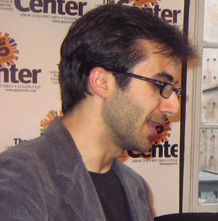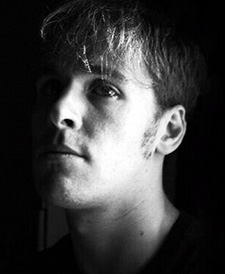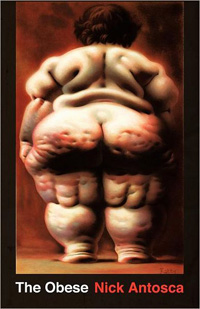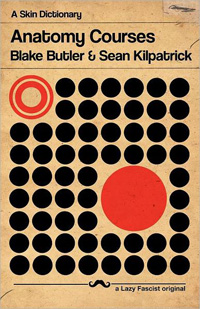Author2Author: Nick Antosca & Blake Butler
I first met Nick Antosca a few years back, shortly after the publication of his first novel, Fires. Recently, he let me know about his latest literary project, a satirical novel called The Obese, and then mentioned that Blake Butler also had a new book, Anatomy Courses, from the same independent press. I’d heard a lot about Butler’s earlier work, especially There Is No Year and Nothing: A Portrait of Insomnia, so I agreed with Nick that he’d probably make for a great conversation partner—soon after, I was emailed the following exchange…
 Nick Antosca: We’ve probably only met in person three or four times, but we’ve known each other a while via the tubes. And now we have books coming out at the same time from Lazy Fascist Press—both pretty weird books. You co-authored Anatomy Courses with Sean Kilpatrick. Collaboration’s a tricky thing… I have a writing partner for film and TV work, but I’ve never tried it with fiction. How’d Anatomy Courses come about for you and Sean?
Nick Antosca: We’ve probably only met in person three or four times, but we’ve known each other a while via the tubes. And now we have books coming out at the same time from Lazy Fascist Press—both pretty weird books. You co-authored Anatomy Courses with Sean Kilpatrick. Collaboration’s a tricky thing… I have a writing partner for film and TV work, but I’ve never tried it with fiction. How’d Anatomy Courses come about for you and Sean?

Blake Butler: Sean and I had known each other online for a while, I think, and talked a bit, but never really met or anything more than a handful of emails or such. I’d read his work, though, and felt really compelled by his tone and approach to sentences. We certainly shared a certain panache for the grotesque not just of image but of banging words together, I think. If I remember correctly I emailed him and mentioned that it might be fun to try to write something together, just to see what would happen. I don’t think we realized until somewhere in the middle we were writing what basically (in my mind) has the structure of a novel, though one destroyed of most everything but language and a few recurring ideas about the bodies and locations that the nastiness takes place in.
I think I sent him a page that would be the first page of the book in a document and then he wrote what ended up being the second page, and we just took turns like that back and forth over something like 10 months it seems like, each adding to where the other had left off, but always beginning a new page. We always alternated pages, and the way we seemed to take cues in the flow of it was more semantic, often, than plotwise; the ground continued shifting as we went, which made it fun. I learned a shitload watching Sean’s process: he’s a super meticulous editor, and a voracious revisor of his own work, in a different way than I am, and so each time I got the thing back I’d often find he’d gone through and fucked with sentences all throughout his prior parts, stacking them and beefing them out and manipulating the phrasing and the space. Sometimes he’d get so caught up on a single sentence he’d work on it a week and send it back with a note saying he didn’t want to hold me up, and I’d do mine in like an hour and send it back and he’d go into the sauna again; each iteration just kept getting more and more ornate and fucked and I loved it. We both did our thing and stole from each other and smeared each other around in our own passages, kind of forming a structure out of machine shit.
Finally one day he sent one of those couple of sentence sections saying he’d been staring at the sentence for a week and couldn’t stop tonguing it or something, and I read the sentence and it lopped my head off, and that was the end of the book. I don’t think we ever intended to make something publishable really, and I’m surprised we found a publisher in Lazy Fascist; and of course, once that came about, the revision circus went into hypermode for us both, and the book really started to eat itself.
What about The Obese? That book seemed to come out of nowhere for me, after Midnight Picnic. I hadn’t heard you were working on anything and began to wonder and then all of a sudden there was this new novel, seemingly much quicker than the gap between Midnight Picnic and the one before it, Fires?
 Nick Antosca: If you look at the publication dates of my books, it probably seems like I just take three years to write these thin, odd little books, when in reality what’s happening is that I’m writing other books that never get published.
Nick Antosca: If you look at the publication dates of my books, it probably seems like I just take three years to write these thin, odd little books, when in reality what’s happening is that I’m writing other books that never get published.
Between Fires and Midnight Picnic there was a weird, loopy novel that’s in a drawer somewhere; between Midnight Picnic and The Obese there was a bad novel that I discarded (a small section of it was the seed of The Obese, though), and then another novel that I wrote and love and have never been able to get published. After that, I started doing more screenwriting and moved to Los Angeles, and then in a very short period of time I wrote The Obese, harvesting an old idea that had been brewing. When I think about how much I’ve written versus how much I’ve actually published, I have to very quickly redirect my thoughts to happier things, because down that path lie madness and an application to law school.
The Obese was one of those ideas that comes to you and delights you even as you’re thinking, well, I can’t write that. Which means, of course, you have to write it. It comes from a conversation I overhead in which these two very skinny women in Bryant Square Park were talking vicious shit about a fat person they knew. And I’d been reading Daphne du Maurier’s short story “The Birds.” So, that happened.
I know some people have been offended by The Obese. One lady on Twitter said she wanted to track me down and punch me in the face. I feel genuinely conflicted when I read stuff like that. There’s a part of my personality that really wants to please people and another part that is reckless and curious and wants to kick over anthills. But I also know it’s death to think, “This won’t offend somebody, will it?” while writing.
How much, if at all, do you think about the reader while you’re writing? Do you worry about sickening or offending readers? Do you worry about pushing them away with the density or opacity of your language, or do you primarily write for your own tastes? You write some seriously challenging stuff, both in terms of form and content; who are you writing for?

Blake Butler: I don’t think I think about who I am writing for beyond the instant, though I do think about writing in phases. Usually the first draft I am trying to think of nothing, to be completely removed even from myself. I’ve found the less I can not only know about what I’m doing, but also the less I try to control it beyond impulse and word to word shifts, the more happy I am with what comes out. It also leads to more interesting configurations of language, for me.
But I also tend to work in bursts and breaks. I like to get up a lot while I am typing and come back when I feel the mood hitting me again, and then stop again before I feel futile. The internet helps me in that way, in that it can be a palette cleanser (or destroyer), and I’m able to keep forgetting and coming back to newly the things I’m playing with.
Editing is also important, as are the jumps between those spurts, which is when I think I try to write like a reader: not like any reader, but by the reader that I am. I am trying to both surprise myself and defeat myself at once, which makes it keep pushing through me in a weird way. I trust myself enough that in the end it will either come out how I want, or I will delete it. Once I’m in the zone I’m pretty good at staying in the zone, for a project, though like you I also will throw off a lot of stuff that never ends up going anywhere. Controlling yourself as a reader, in the way of “Would I be interested in this if I hadn’t written it” is I think super important, and maybe not mentioned enough.
I’ve always found it awesome that you read so many screenplays. I know you also write a lot in that mode, and I wonder if studying the scripts and the films themselves and being active in that area affects how you write fiction?
Nick Antosca: Reading and writing screenplays has definitely affected my fiction-writing, but I’ve always had a “cinematic” sensibility anyway because I’ve watched movies obsessively—especially horror movies—since I was little. Put it this way—as a novelist I turn more to movies than to poetry for inspiration.
When I first started writing fiction, though, I didn’t believe I knew how to build a structured story. It seemed like math to me, and I’m bad at math, and also at planning. Or at least I was then. But screenplays require structure. In a screenplay you’re not really dealing with prose as an art—it’s strictly a tool—so your structure is your art (and to a much lesser degree, so is your dialogue), and I had never really regarded structure that way before. I guess I saw storytelling as a craft, like woodworking, not an art, which in retrospect feels laughabl naive/ignorant. Storytelling now seems to me the highest and most fundamental art.
Also, I feel like if you’re a fiction writer toiling away solo on your novel and you’re stuck on a tough passage/chapter/problem, you can find yourself edging toward what feels like a creative get-out-of-jail-free card—the desire to justify settling with a less-than-ideal solution by saying to yourself, essentially, Well, it’s not perfect but it’s ME, and this is my writing and mine alone, and when I read the great iconoclastic writers I like, sometimes the weird/messy/sloppy parts are the parts I like best, because only THEY could have written those. And that’s just your laziness talking. Writing for movies and TV, which is a very collaborative experience, teaches you not to cheat like that, because smart people you’re working with will point out the problems, and you will be forced to confront them until they are well and truly addressed. And that’s a good thing.
It’s always fun to switch from screenwriting to fiction writing and back again, because they exercise slightly different muscles. But it’s the same arm.
7 May 2012 | author2author |

 Our Endless and Proper Work is my new book with Belt Publishing about starting (and sticking to) a productive writing practice.
Our Endless and Proper Work is my new book with Belt Publishing about starting (and sticking to) a productive writing practice. 
